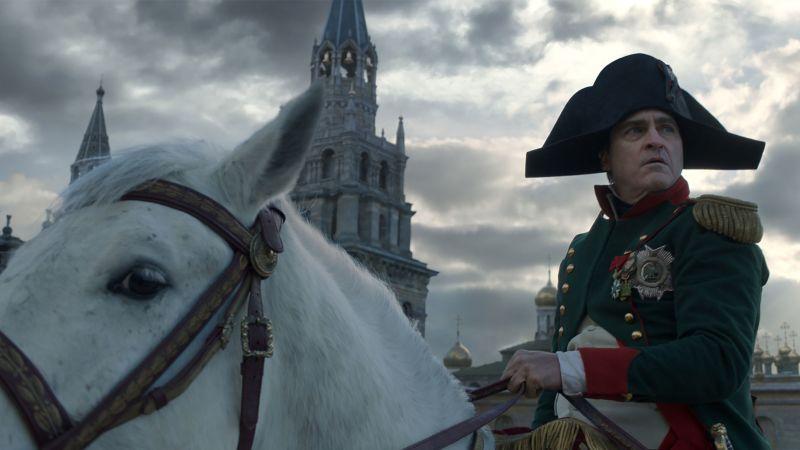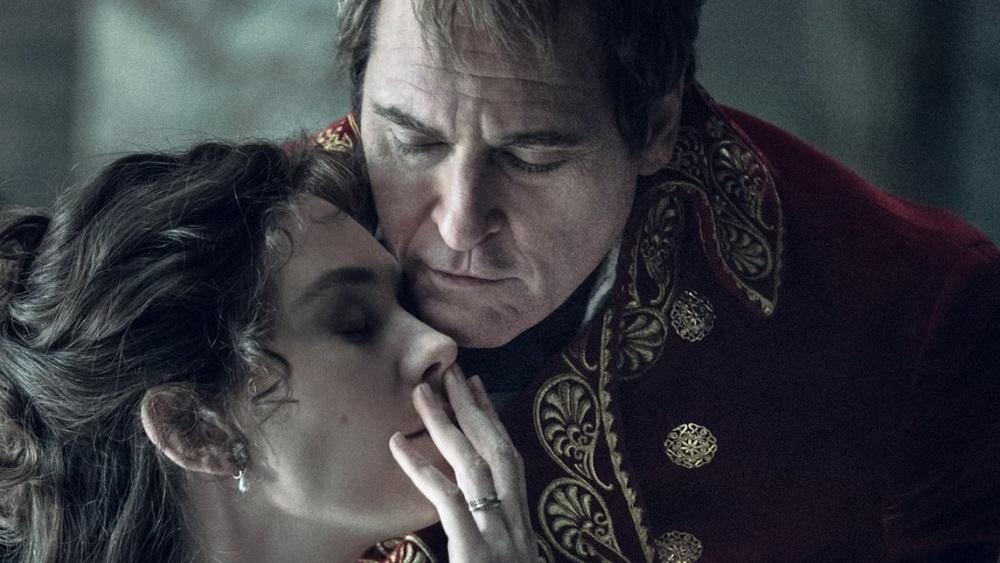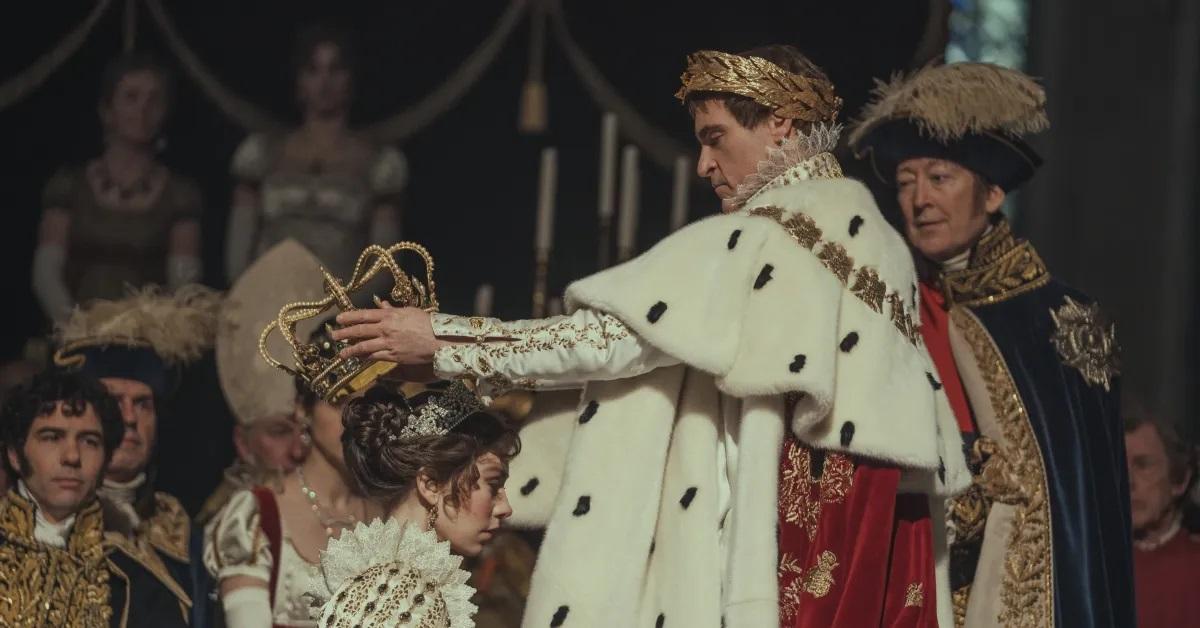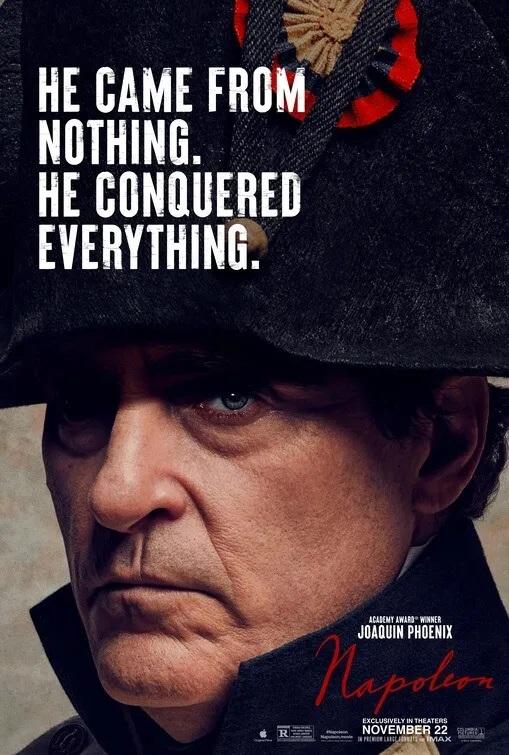Ridley Scott’s Napoleon is the latest in a long line of films attempting to shed light on the controversial historical figure. Unfortunately this historical epic can’t quite reach its lofty goals.
The story of Napoleon Bonaparte has tempted filmmakers almost from the beginning of cinema. His position as one of the most famous and recognizable figures in post-Industrial Revolution history makes him an easy target for films exploiting his conquests and failures, both on the battlefield and in his personal life. Beginning with an 1897 silent film, Napoleon was featured in a multitude of films almost too numerous to count ranging from deathly serious dramas to lighthearted farces. Highlights to modern audiences may include the 1927 silent film Napoleon, several notable adaptations of War and Peace, a noteworthy appearance in Time Bandits, and of course Bill and Ted’s Excellent Adventure.
Napoleon
Directed By: Ridley Scott
Written By: David Scarpa
Starring: Joaquin Phoenix, Vanessa Kirby, Tahar Rahim
Release Date: November 22, 2023
In all this cinematic coverage, we haven’t really gotten a definitive cinematic account of the figure. Despite advances in modern filmmaking over previous versions, Ridley Scott’s latest Napoleon isn’t it. But I wouldn’t say this is a fault of the film itself. 2023’s Napoleon gets credit for trying, but it ultimately yields to the same fate as all of its predecessors when it comes to trying to do justice to the famous Frenchman’s legacy; it can’t. Napoleon remains such a fascinating figure despite all the attention he has received over the years because of the controversy that surrounds him. This sentiment extends not just to his approach to diplomacy, but domestic affairs as well.
Putting this burden on a single film is not fair. It’s a difficult proposition for a 1000 page historical essay, let alone a feature film – even if that film’s runtime pushes towards 3 hours. No matter how you approach it, there will be some form of dissatisfaction at the end. 2023’s Napoleon attempts to wade into the swamp as diplomatically as possible. It charts a course as straight down the middle as it can, deciding to depict the character as neither megalomaniac savant nor charismatic leader of men acting in their best interest. Likewise, it splits its time evenly between Napoleon’s life in the bedroom and outside it.

The film tries to get by with as minimal exposition as possible in order to spend more time in other places (read: battle scenes). It simply inserts Napoleon into major events of the French Revolution whether he was involved or not, just to provide some context for his position later on. While this narrative decision allows the film to move at a brisk pace and not get bogged down in the details, it results in a murky picture of who exactly Napoleon is supposed to be. We scarcely see what makes him so special, only really seeing the aftermath once he has already risen to power.
Thankfully, the crux of Napoleon’s life is not cast aside and is instead the highlight of the film; his relationship with Josephine. The film starts off at a brisk pace, detailing Napoleon’s rise to power as he essentially takes advantage of the chaotic political atmosphere in France following the revolution. It is during this time that Josephine catches his eye. Josephine isn’t quite smitten with Napoleon, but is intrigued by his obsession with her. However, when she publicly cheats on him while he is away with the army, he becomes furious. Later, after consolidating power and declaring himself emperor, Josephine’s inability to produce an heir causes even more friction between the pair.
In this film, Napoleon is defined by the enchantment Josephine has over him. When he storms back to France to chastise her for cheating on him, he can’t help but fall in love with her all over again. He drags his feet on divorce when she can’t provide an heir, ultimately deciding to put the good of the nation in front of his relationship. This is depicted as his turning point and beginning of his downfall. He yearns for her to be part of his life, but with increasing domestic and foreign pressures upon his rule, he has to reluctantly let her go which negatively impacts his well-being. Later, while escaping from exile he makes one last effort to regain his power, not just for power, but to regain his connection with Josephine.

Choosing to pivot the film around the relationship of the two main characters was a good choice for cinematic reasons, but may not be 100% historically accurate. Director Ridley Scott has even admitted to the inaccuracies and shortcuts that were necessary to make the film feasible in the first place. Indeed, even those who are not well versed in French history will feel like the film is a crude cliff notes version of what actually happened. Recognition of the film’s fictional leanings does lessen the dramatic impact, and unfortunately makes it feel more exploitative than informative.
Unfortunately, the decision to cut corners on historical accuracy does not yield a cleaner or more direct storyline either. Part of the problem is first what I had mentioned above, the sheer complexity and controversial nature of Napoleon himself. The film tries to cover as much of the big-picture as possible, but in doing so it still feels like it is stretched thin. The narrative does slow down once battles occur or in more intimate moments between Napoleon and Josephine, but those areas feel like a juxtaposition in themes. For a more cohesive presentation, the film needed to narrow its focus to one area or the other. It was attempting to be both an action-packed epic and a relationship-driven drama.
In reality, Napoleon’s life was both at the same time, but that is a difficult thing to convey on the big screen. The script adds in doses of Napoleon’s family relationships, court drama, and later his time in exile. These add context to what drives Napoleon, but further complicate the story and make the film feel even more discombobulated. When Ridley Scott releases his inevitable director’s cut we will see all the filler material the film is missing, but as is it feels harshly edited and the audience will suffer from whiplash. It also doesn’t help that the supporting characters are only there as de facto narrators, and seem to come and go on a whim.

If you can get past the film’s narrative shortfalls, there is just enough to make it worth watching. With Josephine playing such a pivotal role in the films’ approach, Vanessa Kirby’s portrayal of her is under a lot of scrutiny. Thankfully, she is easily the best part of the film. Her performance is simply mesmerizing; sometimes playful, sometimes curt, captivated by how Napoleon has such control over her but there is a sense of fright as well. I was also surprised to find the film has a biting sense of humor, which was a welcome reprieve to contrast with its darker moments. The film itself is captivating, well shot with sumptuous, at times graphic production design and luxurious details. Ridley Scott remains a formidable recreator of exciting historical battle scenes, and delivers enough creative flourish to make the film’s lengthy runtime pass by smoothly
Joaquin Phoenix’s portrayal of Bonaparte is not as engaging. He is simply fine, intense when he needs to be, playful at others. I think it needed to be a younger actor to bring a sense of restlessness to Napoleon’s formative years. Likewise, the way the film lifts him to power so directly makes it hard to see him as anything but a figure out of a history book. In fact, when he isn’t featured in a scene with Josephine, the script uses him solely for explaining or demonstrating some historical development. Despite watching a three hour film named after Napoleon I understand the general overview of what he accomplished, but don’t feel like I really have a good idea of who he is or why he was successful. Maybe that’s the point.















